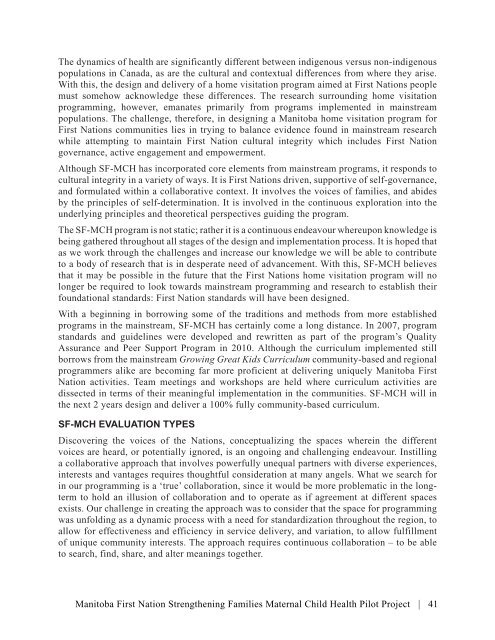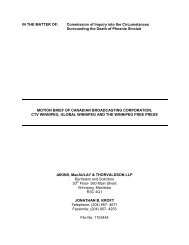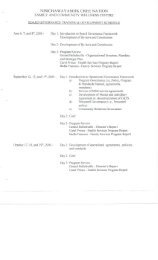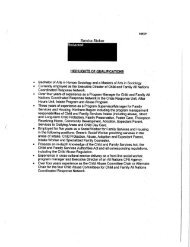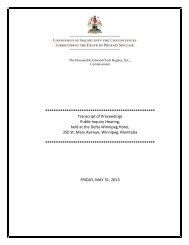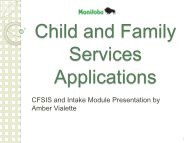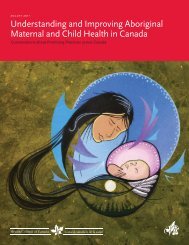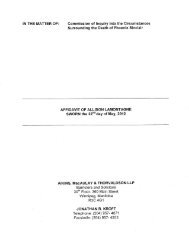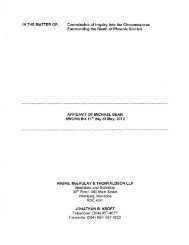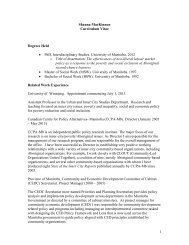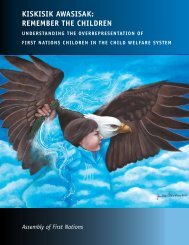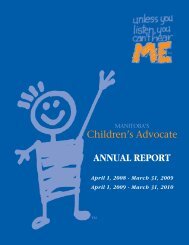Untitled - Phoenix Sinclair Inquiry
Untitled - Phoenix Sinclair Inquiry
Untitled - Phoenix Sinclair Inquiry
You also want an ePaper? Increase the reach of your titles
YUMPU automatically turns print PDFs into web optimized ePapers that Google loves.
The dynamics of health are significantly different between indigenous versus non-indigenous<br />
populations in Canada, as are the cultural and contextual differences from where they arise.<br />
With this, the design and delivery of a home visitation program aimed at First Nations people<br />
must somehow acknowledge these differences. The research surrounding home visitation<br />
programming, however, emanates primarily from programs implemented in mainstream<br />
populations. The challenge, therefore, in designing a Manitoba home visitation program for<br />
First Nations communities lies in trying to balance evidence found in mainstream research<br />
while attempting to maintain First Nation cultural integrity which includes First Nation<br />
governance, active engagement and empowerment.<br />
Although SF-MCH has incorporated core elements from mainstream programs, it responds to<br />
cultural integrity in a variety of ways. It is First Nations driven, supportive of self-governance,<br />
and formulated within a collaborative context. It involves the voices of families, and abides<br />
by the principles of self-determination. It is involved in the continuous exploration into the<br />
underlying principles and theoretical perspectives guiding the program.<br />
The SF-MCH program is not static; rather it is a continuous endeavour whereupon knowledge is<br />
being gathered throughout all stages of the design and implementation process. It is hoped that<br />
as we work through the challenges and increase our knowledge we will be able to contribute<br />
to a body of research that is in desperate need of advancement. With this, SF-MCH believes<br />
that it may be possible in the future that the First Nations home visitation program will no<br />
longer be required to look towards mainstream programming and research to establish their<br />
foundational standards: First Nation standards will have been designed.<br />
With a beginning in borrowing some of the traditions and methods from more established<br />
programs in the mainstream, SF-MCH has certainly come a long distance. In 2007, program<br />
standards and guidelines were developed and rewritten as part of the program’s Quality<br />
Assurance and Peer Support Program in 2010. Although the curriculum implemented still<br />
borrows from the mainstream Growing Great Kids Curriculum community-based and regional<br />
programmers alike are becoming far more proficient at delivering uniquely Manitoba First<br />
Nation activities. Team meetings and workshops are held where curriculum activities are<br />
dissected in terms of their meaningful implementation in the communities. SF-MCH will in<br />
the next 2 years design and deliver a 100% fully community-based curriculum.<br />
SF-MCH EVALUATION TYPES<br />
Discovering the voices of the Nations, conceptualizing the spaces wherein the different<br />
voices are heard, or potentially ignored, is an ongoing and challenging endeavour. Instilling<br />
a collaborative approach that involves powerfully unequal partners with diverse experiences,<br />
interests and vantages requires thoughtful consideration at many angels. What we search for<br />
in our programming is a ‘true’ collaboration, since it would be more problematic in the longterm<br />
to hold an illusion of collaboration and to operate as if agreement at different spaces<br />
exists. Our challenge in creating the approach was to consider that the space for programming<br />
was unfolding as a dynamic process with a need for standardization throughout the region, to<br />
allow for effectiveness and efficiency in service delivery, and variation, to allow fulfillment<br />
of unique community interests. The approach requires continuous collaboration – to be able<br />
to search, find, share, and alter meanings together.<br />
Manitoba First Nation Strengthening Families Maternal Child Health Pilot Project | 41


